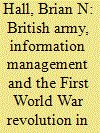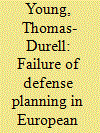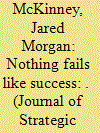|
|
|
Sort Order |
|
|
|
Items / Page
|
|
|
|
|
|
|
| Srl | Item |
| 1 |
ID:
161359


|
|
|
|
|
| Summary/Abstract |
Information Management (IM) – the systematic ordering, processing and channelling of information within organisations – forms a critical component of modern military command and control systems. As a subject of scholarly enquiry, however, the history of military IM has been relatively poorly served. Employing new and under-utilised archival sources, this article takes the British Expeditionary Force (BEF) of the First World War as its case study and assesses the extent to which its IM system contributed to the emergence of the modern battlefield in 1918. It argues that the demands of fighting a modern war resulted in a general, but not universal, improvement in the BEF’s IM techniques, which in turn laid the groundwork, albeit in embryonic form, for the IM systems of modern armies.
|
|
|
|
|
|
|
|
|
|
|
|
|
|
|
|
| 2 |
ID:
161360


|
|
|
|
|
| Summary/Abstract |
By any objective measure, defense institutions in Central and Eastern Europe have all but universally been incapable of producing viable defense plans that are based on objective costing and operational planning data. This situation exists in spite the provision of considerable Western advice and assistance, let alone reporting to and receiving assessments by NATO’s International Staff under Partnership for Peace, as well as via the integrated defense planning and reporting systems. An explanation for this systematic failure across European post-Communist defense institutions can be found in the continued slow development of an over-arching policy framework which directs and approves all activities of the armed forces, as well as the de-centralization of financial decision-making down to capability providers. The essay ends with an examination of the adverse effects of the early introduction of planning programming, budgeting system (PPBS), have had on the development of effective policy and planning capabilities within these defense institutions.
|
|
|
|
|
|
|
|
|
|
|
|
|
|
|
|
| 3 |
ID:
161358


|
|
|
|
|
| Summary/Abstract |
During the July Crisis Britain’s foreign secretary, Sir Edward Grey, focused on organising a conference through which differences could be reconciled. After the war, he maintained that Germany’s unwillingness to join this conference was one of the immediate causes of war. This essay disputes Grey’s contention, arguing that his plans for a conference, based on a misleading analogy to the previous Balkan Crises, actually helped facilitate the outbreak of war in 1914 by sanctioning inaction in the first phase of the crisis (28 June–22 July) and by tacitly encouraging Russian mobilisation in the second phase (23 July–4 August).
|
|
|
|
|
|
|
|
|
|
|
|
|
|
|
|
| 4 |
ID:
161357


|
|
|
|
|
| Summary/Abstract |
The world is mired in history again, as historical modes of competition return and historical grievances fuel the policies of multiple revisionist actors. If the end of history has ended, then it follows that the time is ripe for an engagement with history’s wisdom. We argue that the making of American statecraft—the deliberate, coordinated use of national power to achieve important objectives—can be significantly enhanced by a better understanding of the past. This essay, which draws on the extensive literature on history and statecraft, U.S. foreign policy, and the author’s own research and experiences, offers a defense of the use of history to improve statecraft, as well as a typology of ten distinct ways in which an understanding of history can improve government policy.
|
|
|
|
|
|
|
|
|
|
|
|
|
|
|
|
|
|
|
|
|